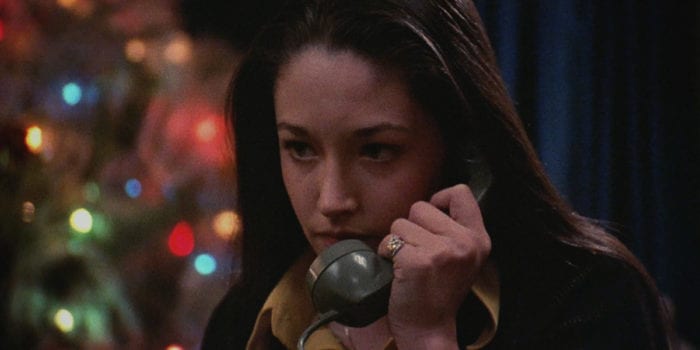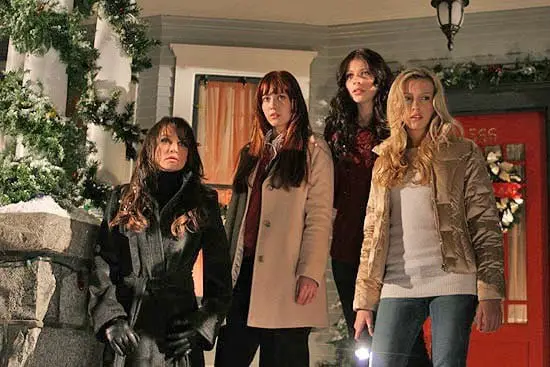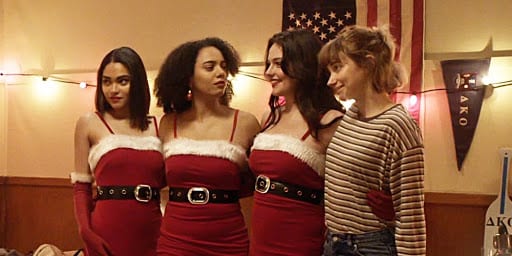Has commercialized holiday cheer got you down? Do you find yourself longing for the ghoulishness of the spooky season amid December decorations? You’ve come to the right place. In the darkest time of the year and in the spirit of traditional ghostly Christmas celebrations, enjoy our “12 Slays of Christmas” series. For twelve days leading up to Christmas day, we will thrill and chill you with analysis of Christmas-related horror films, lore, true crime, and more.
Trigger Warning: This article includes references to rape, sexual assault, abuse, incest, murder, and violence against women.
Despite director Bob Clark labelling it more of a psychological horror, Black Christmas (1974) is considered one of the first-ever slasher films (the first-ever seasonal slasher) and had a significant influence on consequent slashers, such as Halloween (1978). It involves a killing spree within a sorority house at the start of the Christmas break and pioneered the ‘call is coming from inside the house’ trope. Glen Morgan remade it in 2006 to bad reception, but the most recent 2019 remake directed by Sophia Takal was met with a great deal of criticism. Any overtly feminist films tend to be negatively labelled as ‘man-hating’ by misogynists prior to their release, but the criticism for Black Christmas (2019) was mostly in regard to its superficial approach to feminist issues. So, let’s take a look at the different incarnations of Black Christmas and how they present particular topics relating to feminism.
1974 – Dir. Bob Clark

On the surface, the original Black Christmas doesn’t make direct feminist statements; near the start of the film, when Clare refers to a recent case of rape, Barb even replies “you can’t rape a townie” in an instance of victim-blaming. However, the killer is a psychosexual villain who targets solely women and girls, addressing them over the phone in an inherently sexual and creepy manner. He hides from women, luring and attacking them only when he knows they are vulnerable. After killing Clare, he sits her in a rocking chair and places a baby doll in her lap. His actions reflect an inferiority to and infantilisation of women, enjoying control over their bodies after he has killed them. These are all signs of misogyny-fuelled murder.
Even the way in which the murders are dealt with by police resembles patriarchy. When the girls first go to the police to report Clare’s absence, Sergeant Nash refuses to take them seriously and has the same reaction when Jess later reports the threatening phone calls. The sergeant assumes Clare is “off somewhere at a cabin with [her] boyfriend”, and even when the girls are questioned about Clare later, judgmental implications are made; the officer asks if Clare drinks a lot, and implies she is promiscuous by asking who she is seeing apart from Chris. This dismissive and presumptuous attitude in regards to crimes against women has misogynistic undertones. Although Lieutenant Fuller later reprimands Nash, taps the sorority’s phone line, and stations an officer outside the building, he doesn’t figure out who the killer is in time, leading to Barb and Phyl’s deaths. In the end, the police don’t search the whole house, leaving Clare and Mrs. Mac’s bodies in the attic, and Jess vulnerable to the killer. This neglect represents a lack of police protection for women in real life.
Aside from external circumstances, the most prominent display of feminist attitudes in Black Christmas is its discussion of abortion. Jess is pregnant by her boyfriend Peter and tells him forthright that she will be getting an abortion. Peter reacts negatively, taking a violently anti-abortion stance by claiming Jess is a “selfish bitch”. Being the protagonist, Jess is a naturally sympathetic character and is never once condemned by the narrative for wanting an abortion. Instead, Peter is demonised for his opinions and is portrayed as violent (as he smashes up a piano), being suspected as the killer for a significant part of the film. He is framed as a vicious villain and assumed to be perpetrating crimes against women in tandem with his anti-abortion perspective.
In contrast, Jess is the sole survivor of the film and ultimately empathised with by the audience. It should also be noted that the ‘final girl’ trope that manifested in the slasher genre in the following decades is very much subverted in Jess, as she has an active sex life and is not the shyest girl of the group. Although Clark claimed political neutrality in how he made the film, Black Christmas was released only five years after “therapeutic abortion” was legalised in Canada and a year after Roe v. Wade. Within this context, and as such a central aspect of the film, the topic of abortion feels intentional.
After Jess kills Peter under the impression that he is the killer, the plot twist reveals that the killer is in fact an unknown man (labelled ‘Billy’ from his phone call ramblings) who remains alive in the house. Jess is left sleeping and alone, from which the audience can infer she is likely to die. Kind of a downer ending, but extremely effective in its creepiness.
2006 – Dir. Glen Morgan

Keeping with the original premise, the 2006 remake of Black Christmas has the same setting, villain(ish), and follows the same formula of sorority girls getting killed off one by one. It fits comfortably into slasher conventions, with lots of gory action that surpasses its predecessor—but more on that later. The difference with this version lies in its focus on Billy, and a considerably inverted representation of women.
As in the original, Billy hides in the sorority house and kills only women, but Morgan makes the effort of constructing a fleshed-out backstory for him. Lines from the original killer’s phone calls wherein he mentions the names Billy and Agnes are spun into full plotlines; for starters, ‘Billy’ is taken at face value and assigned the name of the killer. In this version, the sorority house used to be his family home, where he was hated and rejected by his parents for having been born with jaundice. After murdering his father, Billy’s mother locks him in the attic and sexually abuses him, leading to Agnes’ birth (Billy’s sister and daughter). Billy inevitably goes on a killing spree as a young man, attacking Agnes and murdering his mother and stepdad, and is sent to a prison for the criminally insane as a result. So, a lot to unpack here.
The choice to give a woman killer such a detailed backstory that places him in the victim position is problematic, especially in the context of child abuse. It adopts the overused ‘abused becomes the abuser’ trope, which is unnecessary and plays into negative perceptions of abuse survivors. A physical condition, murder, sexual abuse, and incest are all sensitive topics that appear to be projected into the plot for shock factor, an exploitative device. (The film was criticised in general for gratuitous gore—Billy eating cookies made out of his dead mother’s skin struck me as particularly over-the-top.) Additionally, Billy’s mother being the origin of his villainy negates a commentary on violence against women, as the focus is then matriarchal violence. This version’s plot twist is that Agnes is killing alongside Billy and kills Kelly’s boyfriend as well as other women, further sidelining any deconstruction of patriarchy. The only moment where Billy’s actions feel misogynistic is when we see him peeping through holes in the floor at Lauren showering, sexualising her.
The issue of police incompetence rears its head again, although this time it is less attached to patriarchy, as the snowstorm that takes place throughout the majority of the film prevents police from being able to reach the sorority house. As a result, the police are entirely absent aside from the one phone call. Instead, the most direct attempt at implementing misogyny is via Kelli’s boyfriend, Kyle. From the get-go, Kyle is portrayed as the ‘a**hole boyfriend’, acting antisocial and unpleasant towards the other girls. We also discover that he has made a sex tape with Megan, proving that he has cheated on Kelli. When eventually confronted about this by Kelli, he lies about it and then storms off, saying “fuck all you bitches”. This seems to be Morgan’s equivalent of Clark’s abortion plot, as both are concerned with the protagonist’s boyfriend being disrespectful. Kyle is also suspected of being the killer at one point in the film, but only briefly, and dies at the hands of Agnes soon afterward. The suspicion cast on him is more obviously supposed to emulate Peter from the original film but feels rather empty. The sex tape plot comes across as petty drama, and there is no tension in Kyle being a suspect, as we already know Billy is the killer, whereas the audience is tricked alongside Jess into thinking Peter has done it in the original film.
After the climactic fight between the killers and the final girl that ends in the house getting burned down, we get another cheap twist of discovering that not only Billy but also Agnes survived the fire. They proceed to murder Leigh and attack Kelli in the hospital in an unnecessarily dragged-out sequence before Agnes dies and Billy gets impaled on a Christmas tree. The original draft ended with Kelli and Leigh receiving a call from Billy in the hospital to pay homage to the 1974 ending but was sadly scrapped for an action-heavy end sequence instead. It does however mean that the final girl has survived at the end without an impending danger.
2019 – Dir. Sophia Takal

Far more than its predecessors, the 2019 remake has a direct focus on feminist issues, specifically rape culture on university campuses. From the first conflict, we recognise an immediate and acute representation of women’s experiences, as Lindsey grasps her keys to protect herself when walking home before getting killed. However, the approach to feminism and patriarchy is described by one critic as “a hodgepodge of buzzwords and ideas” that aims high but essentially falls short.
Conversations between the sorority girls throughout the film involve open discussions of feminism, addressing intersectional issues but in a way that feels forced and unnatural. The very first interaction between women starts with Riley’s friend bursting in and saying “I can’t find my diva cup”, inserting it in front of her when Riley gives her one. Opposite to the intended effect, this extremely unrealistic scene alienated me as an audience member almost instantly. It reads as a clear signpost for feminism, but the nonsensical, on-the-nose nature of it represents how the film in general tries too hard to be feminist, tripping itself up in the process.
The following dialogue between the women has textbook terms and phrases like “white supremacist patriarchy” dotted throughout, again used as signposts without any real substance behind them. Changing the cat’s name from Claude, as in the original, to Claudette in this version pretty much summarises the surface-level feminism operating here. An ignorant instance of badly-researched feminism is when Professor Gelson reads out a patriarchal-sounding quote from feminist author Dr. Camille Paglia, who Riley assumes is a man, and patronisingly one-ups her by announcing the author is a woman. Not only is Paglia an extremely controversial ‘feminist’ but is also transgender and does not identify as a woman at all. Yikes.
During the first act, the plot follows a similar format to the previous incarnations, with sorority girls being murdered by a mysterious killer. The main difference is that creepy phone calls have been updated to match modern times and are now in the form of threatening DMs. Much like the police reaction in the original, the officer is dismissive when Riley reports the DMs, even saying “boys can be…well, you know”. Later, when the fraternity storms the sorority, the same cop arrives at the exact moment Riley and Kris kill one of the attacking DKO pledges. Getting the wrong picture, he pulls a gun on the girls but is immediately killed by another frat boy. The contempt and incompetence are in line with that of Sergeant Nash from the original and have undertones of misogyny, especially with the “boys will be boys” sentiment, if extremely unsubtle.
As the protagonist Riley is a rape survivor, the film maintains a lot of focus on issues of rape and sexual assault. However, she is pushed into taking action against her rapist by Kris in the form of a song and dance performed at the university, directly calling out frat boys for sexual assault. The whole performance has an odd tone; it is clearly supposed to be satirical, as the tune is upbeat, yet the lyrics address a serious issue and the execution feels off. There are instances of tonal whiplash in the original, with transitions from comical to morbid scenes and vice versa, but they feel more appropriately placed. On top of this, Riley is explicitly uncomfortable before, during, and after the performance due to essentially having to relive her trauma, which she repeatedly expresses to her friends. In response, Kris tells her she needs to “be a fighter” and stop “shrinking”—”if not for [her]self, then for [her] sisters”.
This sentiment recurs consistently throughout the film, with Kris shaming Riley for not fighting back against her rapist at every opportunity and likening it to upholding the patriarchy. No respect for Riley’s boundaries or feelings is given, but instead, the responsibility for ending misogyny and rape culture is placed entirely on her shoulders, which is extremely problematic and insulting. Additionally, repeated flashbacks to Riley’s rape are shown, most prevalently when she is fighting her rapist in the battle at the end of the film. Ironically, its PG-13 rating means that significantly less gore, specifically in the context of women’s deaths, is shown on-screen, yet unnecessary shots of sexual assault are frequently placed. Not only is this unnecessary and exploitative, but also triggering.
Towards the end, it is revealed (as suspected) that the DKO fraternity has dabbled in black magic, causing university founder and notorious misogynist Calvin Hawthorne to possess the pledges and murder women. The involvement of the supernatural undercuts any real-world reflection of patriarchy and misogyny, as it narrows it down to a frat cult that can be defeated. Misogyny in real life is ingrained in the fabric of society and expressed via microaggressions as well as direct violence towards and sexual assault of women, so any magical, otherworldly influence trivialises this reality. Furthermore, the twist brings into question whether the DKO pledges were actually evil, as the implication of brainwashing absolves them of any personal responsibility.
Landon, another frat boy, is on the women’s side for the duration until he gets brainwashed towards the end, and Marty’s boyfriend Nate is killed by the fraternity despite expressing misogynistic opinions earlier in the film, leaving some ambiguity. One of the sorority girls, Helena, even turns out to have been working with the fraternity, pleading with Riley to submit, yet is still killed by DKO. This subplot seems to be making a statement about how women who side with men to serve themselves also don’t benefit since they’re always inferior in men’s eyes, but it came across as heavy-handed. The overall theme of dismantling patriarchy is a vast concept spread too thinly when applied to the context of a Black Christmas remake.
Riley and most of the women escape in the end after killing the DKO pledges, in an attempt at an empowering conclusion. However, it feels unearned and also validates Kris’ problematic attitude of burdening rape survivors with the responsibility of ‘fighting back’. If the pledges were brainwashed, then the women potentially just murdered a building full of innocent people, and judging by how the police officer interpreted the situation earlier in the film, Riley and the others could even be arrested. Even the idea that the evil is defeated is condescending in the context of real-world patriarchy.
Each Black Christmas incarnation, despite its same foundation, takes an astoundingly different approach to the perpetrator and to commentary on feminist issues. The original film is a fight against the individual while implying misogynistic motivation and handling an abortion plot with empathy and respect. The 2006 version clumsily shoe-horns in subplots pertaining to misogyny, while wrongly focusing its attention on building sympathy for Billy via an exploitative backstory. The most recent version’s superficial approach to feminism coupled with a disrespectful attitude towards rape survivors casts the net too wide by applying it to a fight against the collective. In spite of problematic views such as Barb’s victim-blaming attitude, Black Christmas (1974) actually takes a more authentic stance on feminism by placing a woman who wants an abortion at the centre of the story and by not criticising her or forcing her into a certain manner of action, as the 2019 remake does with Riley.


